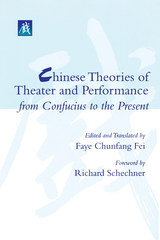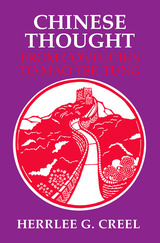
The writings collected here treat the origins, aesthetic principles, and functions of theater. Some are virtual manuals on playwriting and performance techniques; some describe the practices, conditions, and government policies concerning theatrical performance. Many of the selections forcefully dispute the myth that Chinese theater is valuable in performance but lacking in literature--the fact is that there is an equal, if not more prominent, emphasis on theme and content. What emerges from the writings in Chinese Theories of Theater and Performance from Confucius to the Present is a highly evolved and sophisticated aesthetic.
The texts are enhanced by Faye C. Fei's extensive introductions and annotative notes that provide essential background and contextual information. She has provided accurate and engagingly written translations of the texts, making the majority of them available in English for the first time. The anthology will appeal to teachers and students of theater and performance, artists interested in Chinese theater and arts, and scholars and historians of Asia. Literary critics, aestheticians, philosophers, and social scientists will also find the volume of interest, since Chinese conceptions of the theater and performance are closely connected to China's general outlook on the humanities.
Faye C. Fei is Assistant Professor of Dramatic Arts, Macalester College.

"There exists nowhere else such a well-written presentation of the main trends in Chinese thought in so brief a space. The text is not cluttered with Chinese names and the pages are not weighed down with footnotes—but the references are there for those who want them, with suggestions for further readings. This is a book which can be understood by those who have never read anything else about China."—The New York Times Book Review

The importance of the rich corpus of “Masters Literature” that developed in early China since the fifth century BCE has long been recognized. But just what are these texts? Scholars have often approached them as philosophy, but these writings have also been studied as literature, history, and anthropological, religious, and paleographic records. How should we translate these texts for our times?
This book explores these questions through close readings of seven examples of Masters Literature and asks what proponents of a “Chinese philosophy” gained by creating a Chinese equivalent of philosophy and what we might gain by approaching these texts through other disciplines, questions, and concerns. What happens when we remove the accrued disciplinary and conceptual baggage from the Masters Texts? What neglected problems, concepts, and strategies come to light? And can those concepts and strategies help us see the history of philosophy in a different light and engender new approaches to philosophical and intellectual inquiry? By historicizing the notion of Chinese philosophy, we can, the author contends, answer not only the question of whether there is a Chinese philosophy but also the more interesting question of the future of philosophical thought around the world.


The Analects (Lunyu) is one of the most influential texts in human history. As a putative record of Confucius’s (551–479 B.C.E.) teachings and a foundational text in scriptural Confucianism, this classic was instrumental in shaping intellectual traditions in China and East Asia until the early twentieth century.
But no premodern reader read only the text of the Analects itself. Rather, the Analects was embedded in a web of interpretation that mediated its meaning. Modern interpreters of the Analects only rarely acknowledge this legacy of two thousand years of commentaries. How well do we understand prominent or key commentaries from this tradition? How often do we read such commentaries as we might read the text on which they comment? Many commentaries do more than simply comment on a text. Not only do they shape the reading of the text, but passages of text serve as pretexts for the commentator to develop and expound his own body of thought.
This book attempts to redress our neglect of commentaries by analyzing four key works dating from the late second century to the mid-nineteenth century (a period substantially contemporaneous with the rise and decline of scriptural Confucianism): the commentaries of He Yan (ca. 190–249); Huang Kan (488–545); Zhu Xi (1130–1200); and Liu Baonan (1791–1855) and Liu Gongmian (1821–1880).

How has Confucius, quintessentially and symbolically Chinese, been received throughout Japanese history? The Worship of Confucius in Japan provides the first overview of the richly documented and colorful Japanese version of the East Asian ritual to venerate Confucius, known in Japan as the sekiten. The original Chinese political liturgy embodied assumptions about sociopolitical order different from those of Japan. Over more than thirteen centuries, Japanese in power expressed a persistently ambivalent response to the ritual’s challenges and often tended to interpret the ceremony in cultural rather than political terms.
Like many rituals, the sekiten self-referentially reinterpreted earlier versions of itself. James McMullen adopts a diachronic and comparative perspective. Focusing on the relationship of the ritual to political authority in the premodern period, McMullen sheds fresh light on Sino-Japanese cultural relations and on the distinctive political, cultural, and social history of Confucianism in Japan. Successive sections of The Worship of Confucius in Japan trace the vicissitudes of the ceremony through two major cycles of adoption, modification, and decline, first in ancient and medieval Japan, then in the late feudal period culminating in its rejection at the Meiji Restoration. An epilogue sketches the history of the ceremony in the altered conditions of post-Restoration Japan and up to the present.
READERS
Browse our collection.
PUBLISHERS
See BiblioVault's publisher services.
STUDENT SERVICES
Files for college accessibility offices.
UChicago Accessibility Resources
home | accessibility | search | about | contact us
BiblioVault ® 2001 - 2024
The University of Chicago Press









